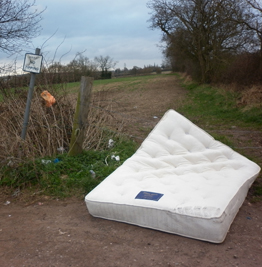Furniture and mattress manufacturers should help contribute to the multi-million pound clear-up of fly-tipping, says a local government body.
The Local Government Association (LGA) wants more manufacturers and retailers of bulky items to voluntarily provide ‘take back’ services – where people can hand in their old mattresses and furniture when they buy new items. They are also urging firms to contribute to the clear-up costs – as councils have to fork out almost £50m annually. Enforcement against fly-tipping costs local authorities nearly £20m a year and councils also want to be able to recover all their prosecution costs after they take the tippers to court.
According to the LGA, the problem is fuelled by people changing homes more frequently and low prices of household consumer goods. Mattresses are a particular problem. They are difficult and expensive to recycle and most of them end up in landfill sites.
The LGA’s call – made in a submission to the Government about tackling waste crime – comes as councils warn the nation’s beauty spots and loveliest villages are under threat from a fresh tide of tipping. Councils dealt with a total of 852,000 incidents of fly-tipping in 2013-14, an increase of 20 per cent since 2012-13. Nearly two-thirds of fly-tips involve household waste. However the submission does say that fly-tipping has shown a broadly downward trend over recent years. Cases include:
Test Valley, Hampshire: villages suffered a spate of incidents, including dumped mattresses.
Gloucestershire: A tip of fridge-freezers, sofas and mattresses was dumped on Cleeve Common.
Telford and Wrekin, West Midlands: A collection of rotting household furniture, an old TV and other rubbish was dumped next to the ruins of Lilleshall Abbey.
Swindon: Old mattresses, furniture and ironing boards were dumped at the historic Railway Village.
LGA Environment spokesman Peter Box said: “Fly-tipping is at a record level and increasingly the country’s loveliest beauty spots and villages are being scarred and disfigured. This blight on our most beautiful countryside, towns and cities is costing councils a fortune when they have already seen significant budget reductions.
“Mattresses and furniture are some of the most fly-tipped items and in these unprecedented circumstances it is only fair that the manufacturers do more to help. It is extremely difficult and costly to recycle mattresses, so most of them end up in landfill sites, which are already under severe pressure. Manufacturers should show leadership on this issue and provide more ‘bring back’ services and contribute towards the cost of councils’ clear-ups, on a voluntary basis.”
In a submission, the LGA says that cleaning up chewing gum alone costs the average town centre £60,000 a year. Around six million cigarette butts are dropped in the City of London alone each year.
As for litter, the LGA points out that litter thrown from vehicles is a major source of overall litter. Identifying the person that dropped the litter from a moving car is hard. This was recognised by the Government which legislated to allow for fines to be issued to
the vehicle owner as part of the Antisocial Behaviour, Crime and Policing Act, a positive step the LGA says. However, regulations must be laid for the powers to come into force.
Visit: http://www.local.gov.uk/.
In Westminster
In London, Westminster City Council on fly-tipping reports targeted patrols by 75 City Inspectors, and has a website function called Report It and an action line. The council will also be turning to social media to encourage residents to report fly-tipping as it is happening.
Richard Beddoe, Westminster City Council cabinet member for city management, said: “We are seeing more and more household rubbish, like microwaves, sofas and TVs being dumped on the streets. It’s alarming, and it is just unacceptable. People need to take greater responsibility for their rubbish, there are hundreds of ways to arrange collections, recycle or dispose of these items. National laws mean we can only take action against fly-tippers if we catch them in the act or have evidence – so we are asking the public to help. We cannot continue to let this happen.”
On social media the council will be encouraging residents to inform the council when they see fly-tipping taking place using #FightTheFlytippers and putting in an address and time. The council will then task City Inspectors to the reported site to stop the activity and issues fines where necessary. Registration numbers of dumpers vehicles ‘in the act’ are also welcomed.










